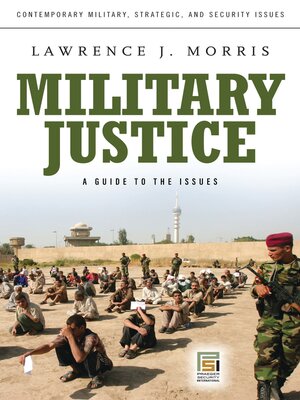Military Justice
ebook ∣ A Guide to the Issues · Contemporary Military, Strategic, and Security Issues
By Lawrence J. Morris

Sign up to save your library
With an OverDrive account, you can save your favorite libraries for at-a-glance information about availability. Find out more about OverDrive accounts.
Find this title in Libby, the library reading app by OverDrive.



Search for a digital library with this title
Title found at these libraries:
| Loading... |
Public, press, and academic interest in the military justice system has increased over the past generation. This is a result of several high-profile trials (the Sergeant Major of the Army and Kelly Flinn, among many others), a popular TV show (even if it was Navy JAGs), and broader public attention to and interest in the military, stemming from the post-Cold War prominence of the military (Gulf War I, Balkans, and post-9/11 operations). In addition, some of the more prominent cases from the war in Iraq, including Abu Ghraib and detainee cases, as well as the GTMO military commissions, have kept military justice in the news. There are many misconceptions about the rudiments of the military justice system. Many perceive severity where there is none (though there are features that differ from the civilian system, sometimes unfavorably for the accused), and few are aware of its unique protections and features. Senators Lott and McConnell were not unique in the inaccurate perceptions they publicly stated about military justice during hearings on military tribunals. This volume would accomplish two main purposes: (1) provide comprehensive, accurate, and current information about the military justice system and related disciplinary features, written in laymen's language; and (2) explain the system through some illustrative or engaging anecdotes (e.g., the trials of Billy Mitchell, William Calley, and the World War II Nazi saboteurs, whose capture and trial provide the basis for today's Guantanamo-based trials of suspected terrorists).






